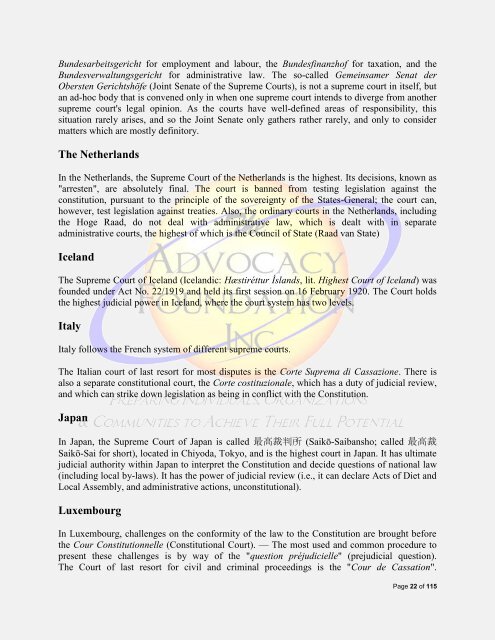Judicial ReEngineering
Judicial ReEngineering
Judicial ReEngineering
Create successful ePaper yourself
Turn your PDF publications into a flip-book with our unique Google optimized e-Paper software.
Bundesarbeitsgericht for employment and labour, the Bundesfinanzhof for taxation, and the<br />
Bundesverwaltungsgericht for administrative law. The so-called Gemeinsamer Senat der<br />
Obersten Gerichtshöfe (Joint Senate of the Supreme Courts), is not a supreme court in itself, but<br />
an ad-hoc body that is convened only in when one supreme court intends to diverge from another<br />
supreme court's legal opinion. As the courts have well-defined areas of responsibility, this<br />
situation rarely arises, and so the Joint Senate only gathers rather rarely, and only to consider<br />
matters which are mostly definitory.<br />
The Netherlands<br />
In the Netherlands, the Supreme Court of the Netherlands is the highest. Its decisions, known as<br />
"arresten", are absolutely final. The court is banned from testing legislation against the<br />
constitution, pursuant to the principle of the sovereignty of the States-General; the court can,<br />
however, test legislation against treaties. Also, the ordinary courts in the Netherlands, including<br />
the Hoge Raad, do not deal with administrative law, which is dealt with in separate<br />
administrative courts, the highest of which is the Council of State (Raad van State)<br />
Iceland<br />
The Supreme Court of Iceland (Icelandic: Hæstiréttur Íslands, lit. Highest Court of Iceland) was<br />
founded under Act No. 22/1919 and held its first session on 16 February 1920. The Court holds<br />
the highest judicial power in Iceland, where the court system has two levels.<br />
Italy<br />
Italy follows the French system of different supreme courts.<br />
The Italian court of last resort for most disputes is the Corte Suprema di Cassazione. There is<br />
also a separate constitutional court, the Corte costituzionale, which has a duty of judicial review,<br />
and which can strike down legislation as being in conflict with the Constitution.<br />
Japan<br />
In Japan, the Supreme Court of Japan is called 最 高 裁 判 所 (Saikō-Saibansho; called 最 高 裁<br />
Saikō-Sai for short), located in Chiyoda, Tokyo, and is the highest court in Japan. It has ultimate<br />
judicial authority within Japan to interpret the Constitution and decide questions of national law<br />
(including local by-laws). It has the power of judicial review (i.e., it can declare Acts of Diet and<br />
Local Assembly, and administrative actions, unconstitutional).<br />
Luxembourg<br />
In Luxembourg, challenges on the conformity of the law to the Constitution are brought before<br />
the Cour Constitutionnelle (Constitutional Court). — The most used and common procedure to<br />
present these challenges is by way of the "question préjudicielle" (prejudicial question).<br />
The Court of last resort for civil and criminal proceedings is the "Cour de Cassation".<br />
Page 22 of 115

















